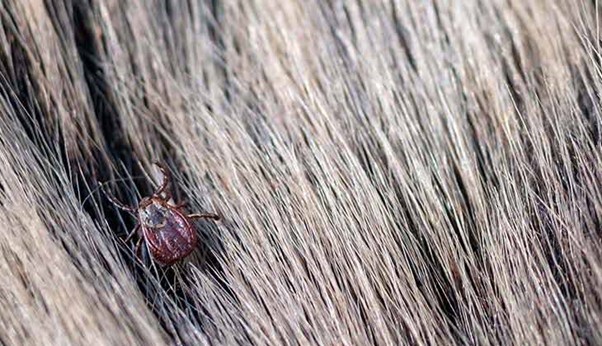Tick-Transmitted Diseases in Dogs
Doggie parents will know that ticks can be very irritating for our furry friends and we all have to consider the pros and cons of tick and flea prevention. The problem with these little nasties is not just that they can cause skin irritation, but that they can also transmit serious, even life-threatening diseases. Many different diseases can be carried and transmitted by different species of ticks.

Where are Rickettsia bacteria found?
These minute bacteria, which can cause life-threatening diseases in dogs, are found all over the world. The bacteria are transmitted by the ticks from one dog to another. In areas where there is high tick infestation, there is more risk of your dog getting infected.
There are two main ways in which these bacteria are transmitted:
- When dogs have access to areas where there are many wildlife, some Rickettsia can be transmitted by the ticks on these animals and can cause serious diseases in dogs.
- Other bacteria may be passed on to animals by Brown Dog Ticks, which feed on dogs. When your dog has contact with large groups of dogs, which have not been treated with tick-preventative medication, diseases caused by Rickettsia are often found.
Does climate affect these bacteria-transmitting ticks?
The bacteria are found in many areas around the world, in many different climates.
- In areas where the Rickettsia which infect wildlife are found, climates vary widely, from temperate to warm. Different species of ticks which carry the bacteria, live in different areas.
- Brown Dog Ticks prefer high temperatures and are therefore more common in warmer, tropical, humid, arid areas.
Rickettsia infections are increasing with a greater risk of disease in our furry friends. This is a result of climate and habitat changes, increases in wildlife populations and consequently more tick-infested animals.

How is Rickettsia transmitted?
The most common source of transmission for dogs is a bite from an infected tick. These bacteria can also be transmitted by contact with infected blood. When the tick bites, saliva from the infected tick is passed into the dog. The longer the tick is feeding from the dog, the more likely that infection will take place. When an infected tick bites a dog, some saliva from the tick is injected into the dog before and during feeding.
Infected dogs (which can exhibit symptoms of the disease or show no signs of illness) may spread the bacteria by the infected ticks which have been feeding on them. Some adult ticks feed on ruminants, such as cattle and sheep, and antelopes. The antelope is not usually infected, but Rickettsia can be passed on through the eggs of the infected tick which has bitten the animal. Rickettsia is then passed on to the next generation of ticks. Small mammals, like mice, which have been infected by immature ticks, are largely responsible for maintaining the Rickettsia bacteria.
In areas where there are large populations of infected ticks, dogs are more likely to become infected by Rickettsia.

What situations put dogs more at risk of catching Rickettsia?
Veterinarians have found the following:
- Rickettsia infections are more likely in situations where dogs are living with many other dogs and where Brown Dog Ticks have established populations.
- When dogs have frequent access to natural environments and an outdoor lifestyle, they have a higher risk of being bitten by infected ticks and contracting Rickettsia bacteria.
- Dogs who have not been protected by tick and flea medications run a higher risk of being bitten by infected ticks and of contracting a disease.
- There are certain breeds of dogs who are more susceptible to being bitten by infected ticks and of catching Rickettsia-based diseases:
Some German Shepherds and English Springer Spaniels have a gene which causes them to have a severe disease after infection.
Cocker Spaniels can have five-times as many ticks which are feeding off them compared to Beagles, when the dogs are living together and where ticks are present. Beagles appear to be less likely to get bitten by ticks.
German Shepherds and Siberian Huskies may be more likely to suffer from severe symptoms after being bitten by an infected tick and contracting a Rickettsia disease such as Ehrlichiosis.
Any dog that is bitten by an infected tick may contract a disease caused by the Rickettsia bacteria. Dogs living in large dog populations may have a higher risk of being bitten by ticks, but the risk of dog-to-dog direct transmission is not increased.
We still have a lot to learn about Rickettsia bacteria. Investigations continue into the symptoms to watch for, caused by Rickettsia infection, treatments for diseases and ways to protect your furry friends from contracting this infection.
The best way to prevent a Rickettsial infection in your dog is to ensure that you remain up to date with your dog’s tick prevention schedule. The easiest way to do this is with Bravecto® where one dose offers extended protection of at least 12 weeks which leaves less chance of forgetting. Bravecto® Chew provides 12 weeks of tick, flea and mite protection and Bravecto® Spot-On for dogs protects for 4 months against ticks and 6 months against fleas in puppies and dogs over 8 weeks of age and 2 kg.
ZA-BRV-220500006
Subscribe to our Newsletter
Get to know your furry friend better! Sign up for all things dog- or cat-related.
The Hairy Facts about the dreaded hairball
12 April 2021
Help! My dog’s barking mad! Volume 2
12 April 2021
Your Itchy, Scratchy Cat – All About Cat Skin Problems
12 April 2021
The Dog’s Diet: A Bone of contention?
01 April 2021
Mango Fly Worms: How to Spot and Eliminate them
Posted on November 28,2019
Managing Mange And Mites In Your Dog
Posted on June 11,2018
Why Do Cats Purr and How? Learn What Your Cat Is Saying
Posted on October 14,2020
How to Get Rid of Ear Mites in Dogs
Posted on November 06,2019









